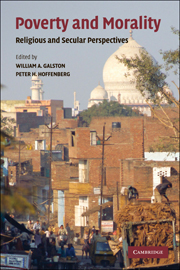Book contents
- Frontmatter
- Contents
- Contributors
- Acknowledgments
- 1 Introduction
- 2 Global Poverty and Unequal Development
- 3 The Karma of Poverty
- 4 Poverty and Morality in Christianity
- 5 Classical Liberalism, Poverty, and Morality
- 6 Confucian Perspectives on Poverty and Morality
- 7 Poverty and Morality
- 8 Hinduism and Poverty
- 9 The Problem of Poverty in Islamic Ethics
- 10 Jewish Perspectives on Poverty
- 11 Liberal Egalitarianism and Poverty
- 12 Marxism and Poverty
- 13 Poverty and Natural Law
- 14 Afterword
- Select Bibliography
- Index
3 - The Karma of Poverty
A Buddhist Perspective
Published online by Cambridge University Press: 05 June 2012
- Frontmatter
- Contents
- Contributors
- Acknowledgments
- 1 Introduction
- 2 Global Poverty and Unequal Development
- 3 The Karma of Poverty
- 4 Poverty and Morality in Christianity
- 5 Classical Liberalism, Poverty, and Morality
- 6 Confucian Perspectives on Poverty and Morality
- 7 Poverty and Morality
- 8 Hinduism and Poverty
- 9 The Problem of Poverty in Islamic Ethics
- 10 Jewish Perspectives on Poverty
- 11 Liberal Egalitarianism and Poverty
- 12 Marxism and Poverty
- 13 Poverty and Natural Law
- 14 Afterword
- Select Bibliography
- Index
Summary
Religious traditions are often conflicted about poverty. Poverty is bad because deprivation involves suffering. Yet the salvation religions offer is not material wealth, and certain types of poverty can even be beneficial in reducing distractions that otherwise interfere with the spiritual life.
Perhaps this tension was easier to live with in premodern cultures, where (what we now consider) poverty was common, if not the norm, and options were more limited. Modern developed (or “economized”) societies offer the possibility of a more secular and materialistic salvation from life’s ills. Whether this deliverance actually delivers us, we now have the economic and technological resources to liberate all human beings from extreme deprivation, if we care to do so. Should that be a collective priority? Can it be done in ways that remain sensitive to other religious hesitations about wealth and do not convert whole societies to consumerism and “moneytheism”?
- Type
- Chapter
- Information
- Poverty and MoralityReligious and Secular Perspectives, pp. 44 - 61Publisher: Cambridge University PressPrint publication year: 2010
- 1
- Cited by

